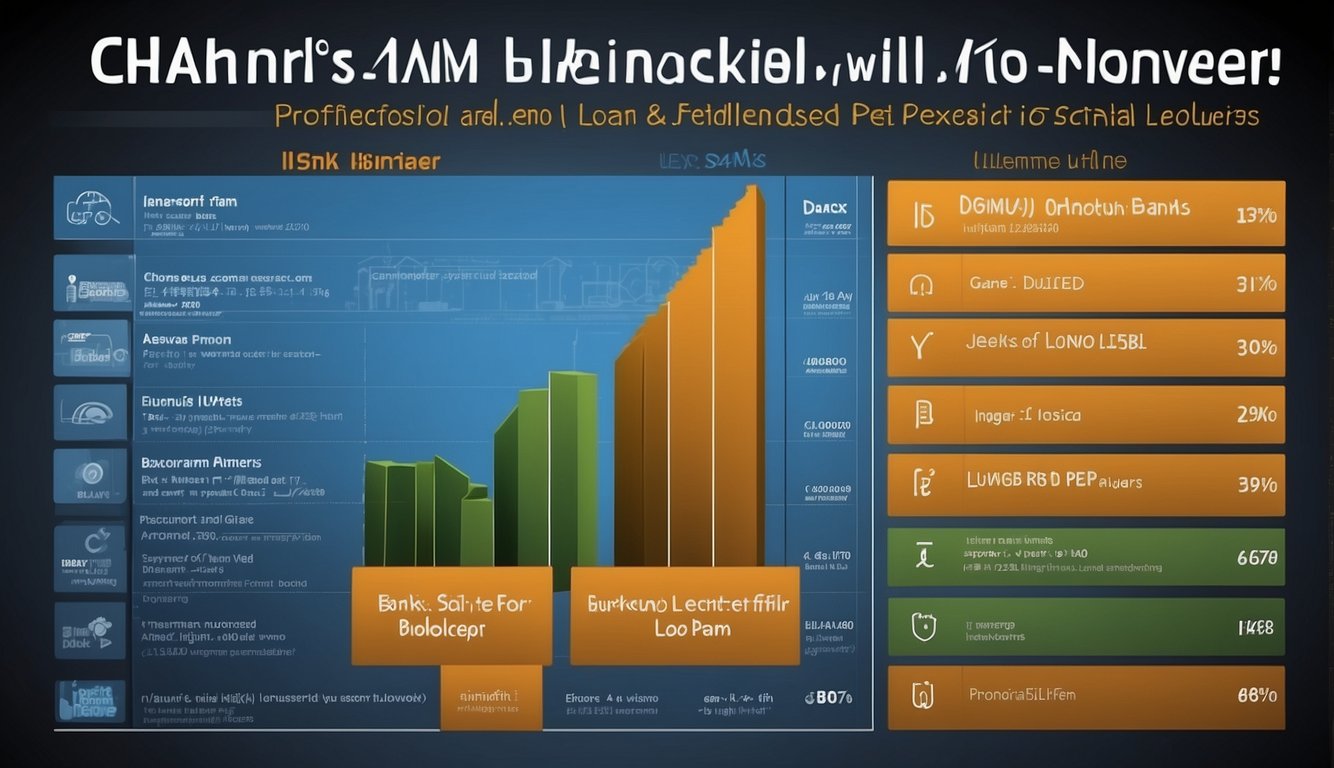Do you need personal loan in Singapore? You have two main options: banks and licensed moneylenders.
While both can provide you with the funds you need, there are significant differences between the two that you should consider before making a decision. In this article, we’ll compare personal loans from banks and licensed moneylenders to help you determine which is better for your needs.

Understanding Personal Loans in Singapore is important before deciding which lender to go with. Personal loans are a type of unsecured loan that can be used for a variety of purposes, such as paying off credit card debt, financing a renovation project, or covering unexpected expenses. Banks and licensed moneylenders offer personal loans with different terms and conditions, so it’s essential to compare them to find the best deal.
When comparing personal loans from banks and licensed moneylenders, there are several factors to consider, such as eligibility and requirements, interest rates and fees, regulations and safeguards, application and disbursement process, repayment strategies and default consequences, and advantages and disadvantages. By weighing these factors, you can make an informed decision about which lender to choose.
Key Takeaways
- Personal loans in Singapore can be obtained from banks and licensed moneylenders.
- Factors to consider when choosing between banks and licensed moneylenders include eligibility, interest rates and fees, regulations, and repayment strategies.
- Choosing the right lender depends on your needs and financial situation.
Understanding Personal Loans in Singapore

Basics of Personal Loans
Personal loans are unsecured loans that can be used for various purposes, such as paying off credit card debts, financing home renovations, or covering unexpected expenses. These loans are typically offered by banks and licensed moneylenders in Singapore.
Differences Between Bank and Moneylender Loans
When it comes to personal loans, there are some key differences between bank and moneylender loans. Bank loans typically have lower interest rates and longer repayment periods, but they also have stricter eligibility criteria and require more documentation. Moneylender loans, on the other hand, are easier to obtain but come with higher interest rates and shorter repayment periods.
Common Uses of Personal Loans
Personal loans can be used for a variety of purposes, such as:
- Consolidating high-interest debts
- Financing home renovations or repairs
- Paying for medical expenses
- Covering unexpected expenses, such as car repairs or emergency travel
Before taking out a personal loan, it’s important to carefully consider your needs and budget, as well as the loan amount, interest rates, and repayment terms. You should also compare different lenders to find the best personal loan interest rates and terms that suit your needs.
Overall, personal loans can be a useful tool for managing your finances and achieving your goals, but it’s important to use them responsibly and only borrow what you can afford to repay.
Eligibility and Requirements

When considering a personal loan, it’s essential to understand the eligibility criteria for both banks and licensed moneylenders. Let’s delve into the key factors to consider when assessing your suitability for a loan.
Eligibility Criteria for Banks and Moneylenders
Banks typically have stringent eligibility requirements, often requiring a minimum income threshold and a good credit score. On the other hand, licensed moneylenders may have more flexible criteria, making it easier for a broader range of individuals to qualify for a loan.
Income and Employment Verification
Banks usually demand thorough income and employment verification to ensure borrowers have a stable source of income. This may involve providing payslips, employment contracts, or bank statements. Licensed moneylenders may have less stringent verification processes, making it more accessible for individuals with irregular income or freelancers.
Credit History and Credit Score
Your credit history and credit score play a significant role in determining your eligibility for a bank loan. A good credit score is often a prerequisite for securing a loan with favourable terms. Conversely, licensed moneylenders may be more lenient towards individuals with less-than-perfect credit histories, providing an alternative for those with lower credit scores.
Overall, understanding the eligibility and requirements for both banks and licensed moneylenders is crucial in making an informed decision about which option best suits your needs.
Comparing Interest Rates and Fees

When it comes to taking out a personal loan, one of the most important factors to consider is the interest rate. This is the percentage at which the loan will accrue interest over time, and it can have a big impact on the total amount you end up paying back.
How Interest Rates Are Determined
Interest rates on personal loans are typically determined by a number of factors, including your credit score, income, and the amount you are borrowing. For example, if you have a high credit score and a stable income, you may be able to qualify for a lower interest rate. On the other hand, if you have a low credit score or a high debt-to-income ratio, you may be offered a higher interest rate to offset the perceived risk.
Additional Costs: Fees and Charges
In addition to interest rates, it’s important to consider any additional fees and charges that may be associated with a personal loan. These can include processing fees, late payment fees, and service charges, among others.
When comparing personal loans from banks and licensed moneylenders, it’s important to pay close attention to these fees and charges. While banks may offer lower interest rates, they may also charge higher processing fees or other charges that can add up over time. Licensed moneylenders, on the other hand, may have higher interest rates but lower fees and charges overall.
Understanding Effective Interest Rate (EIR) and Annual Percentage Rate (APR)
When comparing personal loan interest rates, it’s important to understand the difference between the effective interest rate (EIR) and the annual percentage rate (APR). The EIR takes into account any fees or charges associated with the loan, while the APR does not. As a result, the EIR can give you a more accurate picture of the total cost of the loan over time.
Overall, when comparing personal loans from banks and licensed moneylenders, it’s important to consider both the interest rate and any additional fees or charges that may be associated with the loan. While a lower interest rate may seem more attractive at first glance, it’s important to look at the total cost of the loan over time to determine which option is truly the best fit for your needs.
Regulations and Safeguards

When it comes to personal loans, it is important to consider the regulations and safeguards in place to protect borrowers. In Singapore, both banks and licensed moneylenders are regulated by various government entities to ensure fair and ethical lending practices. Here are a few key regulations and safeguards to keep in mind:
Ministry of Law and Moneylenders Act
Licensed moneylenders in Singapore must adhere to the Moneylenders Act, which is enforced by the Ministry of Law. This act sets out various restrictions and requirements for licensed moneylenders, including limits on interest rates and late fees, as well as requirements for advertising and loan contracts. By working with a licensed moneylender, you can be confident that they are operating within the law and that your rights as a borrower are protected.
Monetary Authority of Singapore’s Role
In addition to the Ministry of Law, the Monetary Authority of Singapore (MAS) also plays a role in regulating the lending industry. The MAS is responsible for overseeing banks and other financial institutions, including their lending practices. This means that if you choose to take out a personal loan from a bank, you can be confident that they are operating within the guidelines set out by the MAS.
Registry of Moneylenders and Legal Compliance
The Registry of Moneylenders is another government entity that oversees licensed moneylenders in Singapore. This registry maintains a list of licensed moneylenders and ensures that they are complying with the Moneylenders Act. By working with a licensed moneylender that is listed on the Registry of Moneylenders, you can be confident that they are operating legally and ethically.
Overall, both banks and licensed moneylenders in Singapore are subject to strict regulations and safeguards to protect borrowers. Whether you choose to take out a personal loan from a bank or a licensed moneylender, it is important to do your research and ensure that the lender you choose is operating within the law.
Application and Disbursement Process

When it comes to applying for a personal loan, the process can differ between banks and licensed moneylenders. Here are the steps you need to take to apply for a personal loan from either a bank or licensed moneylender in Singapore.
Steps to Apply for a Personal Loan
Bank
When applying for a personal loan from a bank, you can typically do so online or in-person at a branch. You will need to fill out an application form and provide the necessary documentation. You may also need to provide proof of income and employment.
Licensed Moneylender
Licensed moneylenders in Singapore may offer online and in-person loan applications. You will need to fill out an application form and provide the necessary documentation. Some licensed moneylenders may also require proof of income and employment.
Documentation and Approval
Bank
When applying for a personal loan from a bank, you will need to provide documentation such as your NRIC, proof of income, and employment. The bank will then assess your application and determine whether or not you are eligible for a loan.
Licensed Moneylender
Licensed moneylenders in Singapore may require documentation such as your NRIC, proof of income, and employment. However, some licensed moneylenders may be more lenient when it comes to documentation and approval.
Receiving the Loan Amount
Bank
If your personal loan application is approved by a bank, the loan amount will typically be disbursed directly to your bank account. You can then use the funds as needed.
Licensed Moneylender
If your personal loan application is approved by a licensed moneylender, the loan amount will typically be disbursed to you in cash or via bank transfer. Some licensed moneylenders may offer instant approval and disbursement of the loan amount.
Overall, both banks and licensed moneylenders offer personal loans in Singapore. However, the application and disbursement process can differ between the two. It is important to consider your needs and preferences when deciding which option is best for you.
Repayment Strategies and Default Consequences

When it comes to personal loans, repayment strategies are crucial to ensure that you do not fall into a debt trap. Both banks and licensed moneylenders offer various repayment strategies that you can choose from to suit your needs.
Creating a Sustainable Payment Plan
Before taking out a personal loan, it is important to assess your financial situation and create a sustainable payment plan. This means determining how much you can afford to repay each month without straining your finances.
Most banks offer flexible repayment plans that allow you to choose the repayment period and monthly repayment amount. This can help you manage your finances better and avoid defaulting on your loan. Licensed moneylenders, on the other hand, may not offer as much flexibility in their repayment plans.
Consequences of Defaulting on a Loan
Defaulting on a loan can have serious consequences, including legal action, damage to your credit score, and bankruptcy. Banks and licensed moneylenders have different policies when it comes to defaulting on a loan.
Banks are more likely to take legal action against you if you default on your loan. They may also report your default to credit bureaus, which can damage your credit score and make it harder for you to obtain credit in the future. Licensed moneylenders, on the other hand, may be more lenient when it comes to defaulting on a loan.
Negotiating with Lenders in Financial Hardship
If you are experiencing financial hardship and are struggling to repay your loan, it is important to communicate with your lender. Both banks and licensed moneylenders may be willing to negotiate with you and offer a repayment plan that suits your needs.
However, it is important to note that negotiating with lenders in financial hardship may not always be successful. Some lenders may be unwilling to offer flexible repayment plans, which can make it difficult for you to repay your loan.
In summary, when it comes to personal loans, repayment strategies are crucial to ensure that you do not fall into a debt trap. Both banks and licensed moneylenders offer various repayment strategies that you can choose from to suit your needs. Defaulting on a loan can have serious consequences, including legal action, damage to your credit score, and bankruptcy. Finally, if you are experiencing financial hardship and are struggling to repay your loan, it is important to communicate with your lender and negotiate a repayment plan that suits your needs.
Advantages and Disadvantages

When it comes to personal loans, you have two options: banks and licensed moneylenders. Both have their own set of advantages and disadvantages, and it’s important to understand them before making a decision. In this section, we’ll explore the pros and cons of both bank personal loans and licensed moneylender loans.
Pros and Cons of Bank Personal Loans
Pros
- Lower interest rates: Bank personal loans typically come with lower interest rates compared to licensed moneylender loans. This means you can save money in the long run by choosing a bank loan.
- Higher loan amounts: Banks usually offer higher loan amounts compared to licensed moneylenders. If you need a large sum of money, a bank personal loan might be a better option.
- Reputable lenders: Banks are reputable financial institutions that are regulated by the Monetary Authority of Singapore (MAS). This means you can trust that you’re dealing with a legitimate lender.
Cons
- Stringent eligibility criteria: Banks have strict eligibility criteria that you must meet in order to qualify for a personal loan. This includes having a good credit score, a stable income, and a low debt-to-income ratio. If you don’t meet these criteria, you may not be able to get a bank personal loan.
- Longer processing time: Banks typically take longer to process personal loan applications compared to licensed moneylenders. If you need money urgently, a bank loan may not be the best option.
- Collateral requirements: Banks may require collateral in order to approve your personal loan application. This means you’ll need to put up an asset, such as your home or car, as security for the loan.
Pros and Cons of Licensed Moneylender Loans
Pros
- Faster processing time: Licensed moneylenders are known for their quick processing times. If you need money urgently, a licensed moneylender loan might be a better option.
- Less stringent eligibility criteria: Licensed moneylenders have less stringent eligibility criteria compared to banks. This means you may be able to get a loan even if you have a poor credit score or a low income.
- No collateral requirements: Licensed moneylenders usually don’t require collateral in order to approve your loan application.
Cons
- Higher interest rates: Licensed moneylender loans come with higher interest rates compared to bank personal loans. This means you’ll end up paying more in interest over the life of the loan.
- Loan sharks and harassment tactics: Unlicensed moneylenders, also known as loan sharks, are a major problem in Singapore. If you choose a licensed moneylender, make sure they’re reputable and don’t engage in harassment tactics if you’re unable to repay the loan.
Making the Right Choice for Your Needs

When it comes to choosing between a personal loan from a bank or a licensed moneylender in Singapore, it is important to consider your financial situation, loan purpose and urgency, and seek financial advice.
Assessing Your Financial Situation
Before applying for a personal loan, assess your financial situation. Determine how much you need to borrow, your ability to repay the loan, and your credit score. If you have a low credit score, you may have difficulty getting approved for a loan from a bank. In such cases, a licensed moneylender may be a better option. However, keep in mind that licensed moneylenders charge higher interest rates than banks.
Considering Loan Purpose and Urgency
Consider the purpose of your loan and the urgency of your financial needs. If you need money quickly, a licensed moneylender may be able to provide you with the funds you need faster than a bank. However, if you are consolidating debt or financing a large purchase, a bank may offer more competitive interest rates and longer repayment terms.
Seeking Financial Advice
It is always a good idea to seek financial advice before taking out a personal loan. A financial advisor can help you determine if a personal loan is the right choice for your financial situation and help you decide between a bank or licensed moneylender. They can also help you create a budget and develop a plan to repay your loan on time.
In conclusion, choosing between a personal loan from a bank or licensed moneylender depends on your individual financial situation, loan purpose, and urgency. Assess your financial situation, consider the purpose and urgency of your loan, and seek financial advice before making a decision.
Special Considerations for Different Borrowers

Foreigners and Personal Loans in Singapore
If you are a foreigner, you may find it challenging to get a personal loan from a bank in Singapore. Banks have strict requirements, and they usually require you to have a work visa that is valid for at least one year. Additionally, you must have a minimum income of $30,000 per annum. If you do not meet these requirements, you may have to consider taking a personal loan from a licensed moneylender.
Licensed moneylenders can be a good option for foreigners who need a personal loan. They have less strict requirements and may be more willing to lend money to foreigners. However, you should be aware that licensed moneylenders charge higher interest rates than banks. Therefore, you should only borrow what you need and ensure that you can repay the loan on time.
Singaporeans and Permanent Residents
If you are a Singaporean or permanent resident, you have more options when it comes to personal loans. You can choose to borrow from a bank or a licensed moneylender. Banks offer lower interest rates than licensed moneylenders, but they have stricter requirements. You must have a good credit score and a stable income to qualify for a personal loan from a bank.
Licensed moneylenders, on the other hand, have less strict requirements and may be more willing to lend money to those with lower credit scores or irregular income. However, you should be aware that licensed moneylenders charge higher interest rates than banks. Therefore, you should only borrow what you need and ensure that you can repay the loan on time.
Loan Options for Those with Irregular Income
If you have irregular income, it can be challenging to get a personal loan from a bank. Banks usually require borrowers to have a stable income and a good credit score. However, licensed moneylenders may be more willing to lend money to those with irregular income.
If you have irregular income, you should consider taking a personal loan from a licensed moneylender. However, you should be aware that licensed moneylenders charge higher interest rates than banks. Therefore, you should only borrow what you need and ensure that you can repay the loan on time.
Frequently Asked Questions

What are the exhilarating benefits of choosing a bank for a personal loan in Singapore?
If you’re looking for a personal loan in Singapore, banks are a great option. They offer a range of benefits that can make the process of getting a loan much smoother. For example, banks usually offer higher loan amounts than licensed moneylenders, which means you can get the money you need to cover your expenses. Additionally, banks typically have longer repayment periods, which can make it easier for you to manage your finances.
Can you feel the rush of getting a quick loan from licensed moneylenders?
Licensed moneylenders can be a great option if you need a quick loan. They are known for their fast processing times, which means you can get the money you need in a hurry. Additionally, licensed moneylenders are often more flexible than banks when it comes to repayment periods and loan amounts. However, it’s important to note that licensed moneylenders typically charge higher interest rates than banks, so you’ll need to weigh the benefits of getting a quick loan against the potential cost.
Who offers the most fantastic interest rates for personal loans in Singapore?
When it comes to interest rates for personal loans in Singapore, banks are generally your best bet. They offer some of the lowest interest rates on the market, which can save you a significant amount of money over the life of your loan. However, it’s important to shop around and compare rates from different banks to make sure you’re getting the best deal possible.
Are you ready to discover the safest options for personal loans in Singapore?
If safety is your top priority when it comes to personal loans, banks are the way to go. They are regulated by the Monetary Authority of Singapore (MAS), which means they are subject to strict rules and regulations designed to protect consumers. Additionally, banks are typically more transparent than licensed moneylenders when it comes to fees and charges, which can help you avoid unexpected costs.
What’s the thrilling process to secure a personal loan from private individuals?
Securing a personal loan from a private individual can be a thrilling experience, but it’s important to approach the process with caution. Private individuals are not regulated by the MAS, which means there is a higher risk of fraud or scams. If you decide to pursue a loan from a private individual, make sure you do your research and only work with reputable lenders.
How can you avoid the fright of loan shark harassment when looking for a loan in Singapore?
Loan shark harassment is a serious problem in Singapore, and it’s important to take steps to protect yourself when looking for a loan. One of the best ways to avoid loan shark harassment is to work with licensed moneylenders or banks. Additionally, you should avoid borrowing more than you can afford to repay, and make sure you understand all the terms and conditions of your loan before signing on the dotted line. If you do experience loan shark harassment, it’s important to report it to the police right away.

